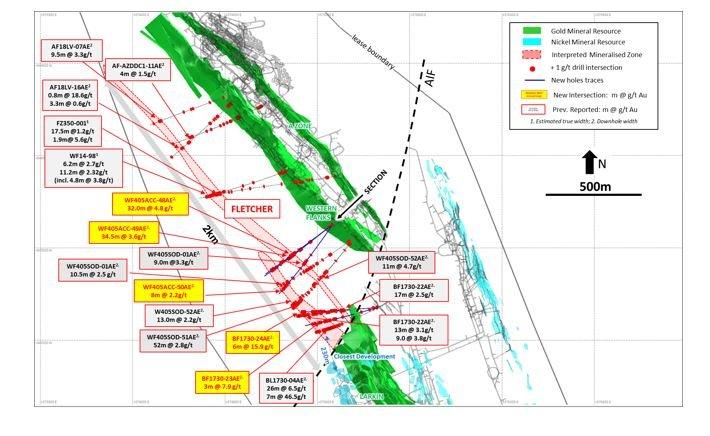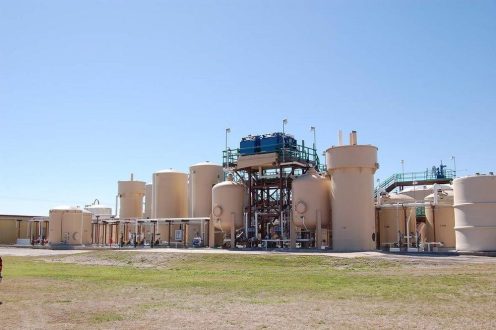
Karora Reports Results from Fletcher South Infill Drill Program Showing Strong Continuity with Intersections of 15.9 g/t Over 6.0 Metres and 4.8 g/t Over 32.0 Metres
Fletcher Highlights1
- WF405ACC-48AE: 8 g/t over 32.0 metres and 4.9 g/t over 5.0 metres
- WF405ACC-49AE: 6 g/t over 34.5 metres and 11.2 g/t over 2.0 metres
- BF1730-24AE: 15.9 g/t over 6.0 metres (EOH) and 18.0 g/t over 3.0 metres
- Interval lengths are downhole widths. Estimated true widths cannot be determined with available information.
Paul Andre Huet, Chairman & CEO, commented: "Today’s update on the southern portion of the Fletcher Zone continues to build on the exciting drill results we have reported from this area over the last several months (see Karora news releases dated April 13 and August 8, 2023). We continue to see very strong grades associated with the FSZ, which has an interpreted strike length of 2.0 km. These results further support our interpretation of Fletcher as a Western Flanks structural analogue, which has been the largest and most promising shear zone for gold production to-date at Beta Hunt.
The southern end of Fletcher is positioned very near to existing nickel infrastructure in the Beta Block and the Larkin Mineral Reserve to the south, only 250 metres from hole BL1730-04AE. Once again, this demonstrates the infrastructure advantage we enjoy at Beta Hunt with over 400 km of existing tunnels which generally offer a great potential head start to bring new production areas online, such as with Fletcher.
Overall, Fletcher continues to add to the potential for significant ongoing Mineral Resource growth at Beta Hunt to continue the several years of impressive ounce additions already demonstrated at our flagship asset."
Fletcher Exploration Drilling Update
Background
The gold mineralized Fletcher Shear Zone (FSZ) was discovered in 2016 (See Karora news release dated July 6, 2016) and is considered a structural analogue to the Western Flanks and A Zone deposits, representing Beta Hunt’s third major mineralized shear zone system in the Hunt Block. The FSZ comprises foliated biotite-pyrite altered and irregularly quartz veined basalt – similar alteration to that found at Western Flanks. Pre-2023 drilling results outlined a steep, west-dipping zone over 150 metres in down dip extent over 500 metres of strike with potential to extend over a total strike length of 2 kilometres (See Karora news releases dated September 16, 2019; January 24, 2022; May 24, 2022).
Drilling in 2023 has targeted the southern 500 metre extent of the FSZ potential strike length north of the AIF. A total of 5,657m has been drilled as part of the 2023 program. All holes encountered significant mineralization in the targeted FSZ position with additional mineralization intersected in between the Western Flanks and the FSZ indicating potential for parallel mineralized lodes in the footwall and hangingwall to the FSZ.
Recent Results
The follow-up nine-hole diamond drill program was completed. Holes were spaced on a nominal 120 metre X 80 metre grid. Outstanding assay results (Figure 1) from this program (five holes) have now been received and significant intersections1 from each hole are summarised below:
- WF405ACC-48AE: 4.8 g/t over 32 metres and 4.9 g/t over 5.0 metres
- WF405ACC-49AE: 3.6 g/t over 34.5 metres and 11.2 g/t over 2.0 metres
- BF1730-24AE: 15.9 g/t over 6.0 metres (EOH) and 18.0g/t over 3.0 metres
- BF1730-23AE: 7.9 g/t over 3.0 metres
- WF405ACC-50AE: 7.3 g/t over 3.0 metres and 2.2 g/t over 8.0 metres
- Interval lengths are downhole widths. Estimated true widths cannot be determined with available information.
The final results have produced a revised understanding of the southern FSZ which is now interpreted to occur 100 metres further east and closer to the Western Flanks Mineral Resource (Figure 1). This interpretation is supported by wide, mineralized intersections (> 30 metres) recently achieved by drilling on the most northern line of the infill program (Figure 2). These intersections are associated with strong shearing, alteration/quartz veining (Figure 3) and are located adjacent to the 120 metre Fletcher fault offset – all features characteristic of the FSZ.
The variably broad and narrow mineralized zones comprising both shear and extensional quartz veining west of the southern FSZ are now interpreted as part of a new mineralized system in the hangingwall of the main FSZ. The significance of the hangingwall system was again underlined by recent results including 15.9 g/t over 6.0 metres (EOH – BF1730-24AE1) and 7.9 g/t over 3 metres (BF1730-23AE).
- Jammed drill rods at the end of hole (EOH) prevented the hole from reaching the target depth.
Following the success of the initial Fletcher infill drill program, a second infill program concentrating around the most northern section of the recently completed program is planned for Q4. The results of this second program will be assessed with the aim of producing an initial Mineral Resource for Fletcher.
Compliance Statement (JORC 2012 and NI 43-101)
The disclosure of scientific and technical information contained in this news release has been reviewed and approved by Stephen Devlin, FAusIMM, Group Geologist, Karora Resources Inc., a Qualified Person for the purposes of NI 43-101.
At Beta Hunt all drill core sampling is conducted by Karora personnel. Samples for gold analysis are shipped to SGS Mineral Services of Kalgoorlie for preparation and assaying by 50 gram fire assay analytical method. All gold diamond drilling samples submitted for assay include at least one blank and one Certified Reference Material ("CRM") per batch, plus one CRM or blank every 20 samples. In samples with observed visible gold mineralization, a coarse blank is inserted after the visible gold mineralization to serve as both a coarse flush to prevent contamination of subsequent samples and a test for gold smearing from one sample to the next which may have resulted from inadequate cleaning of the crusher and pulveriser. The lab is also required to undertake a minimum of 1 in 20 wet screens on pulverised samples to ensure a minimum 85% passing at -75µm. Samples for nickel analysis are shipped to SGS Australia Mineral Services of Kalgoorlie for preparation. Pulps are then shipped to Perth for assaying. The analytical technique is ICP41Q, a four acid digest ICP-AES package. Assays recorded above the upper detection limit (25,000ppm Ni) are re-analyzed using the same technique with a greater dilution (ICP43B). All samples submitted for nickel assay include at least one CRM per batch, with a minimum of one CRM per 20 samples. Karora operates an industry best practice QA/QC process to ensure the integrity of all assay results.
About Karora Resources
Karora is focused on increasing gold production to a targeted range of 170,000-195,000 ounces by 2024 at its integrated Beta Hunt Gold Mine and Higginsville Gold Operations ("HGO") in Western Australia. The Higginsville treatment facility is a low-cost 1.6 Mtpa processing plant, which is fed at capacity from Karora’s underground Beta Hunt mine and Higginsville mines. In July 2022, Karora acquired the 1.0 Mtpa Lakewood Mill in Western Australia. At Beta Hunt, a robust gold Mineral Resource and Reserve are hosted in multiple gold shears, with gold intersections along a 5 km strike length remaining open in multiple directions. HGO has a substantial Mineral gold Resource and Reserve and prospective land package totaling approximately 1,900 square kilometers. Karora has a strong Board and management team focused on delivering shareholder value and responsible mining, as demonstrated by Karora’s commitment to reducing emissions across its operations. Karora’s common shares trade on the TSX under the symbol KRR and on the OTCQX market under the symbol KRRGF.
Cautionary Statement Concerning Forward-Looking Statements
This news release contains "forward-looking information" including without limitation statements relating to, among other items, the production potential of the Fletcher Shear Zone, the potential for significant ongoing Mineral Resource growth at Beta Hunt, production guidance, timing for completion of capital projects, timing for the commencement of mining, liquidity and capital resources of Karora, organic growth profile and the potential of the Corporation’s exploration projects, mines, processing facilities and operations.
Forward-looking statements involve known and unknown risks, uncertainties and other factors which may cause the actual results, performance or achievements of Karora to be materially different from any future results, performance or achievements expressed or implied by the forward-looking statements. Factors that could affect the outcome include, among others: future prices and the supply of metals; the results of drilling; inability to raise the money necessary to incur the expenditures required to retain and advance the properties; environmental liabilities (known and unknown); general business, economic, competitive, political and social uncertainties; results of exploration programs; accidents, labour disputes and other risks of the mining industry; political instability, terrorism, insurrection or war; or delays in obtaining governmental approvals, projected cash operating costs, failure to obtain regulatory or shareholder approvals. For a more detailed discussion of such risks and other factors that could cause actual results to differ materially from those expressed or implied by such forward-looking statements, refer to Karora ’s filings with Canadian securities regulators, including the most recent Annual Information Form, available on SEDAR at www.sedar.com.
Although Karora has attempted to identify important factors that could cause actual actions, events or results to differ materially from those described in forward-looking statements, there may be other factors that cause actions, events or results to differ from those anticipated, estimated or intended. Forward-looking statements contained herein are made as of the date of this news release and Karora disclaims any obligation to update any forward-looking statements, whether as a result of new information, future events or results or otherwise, except as required by applicable securities laws.
For more information, please contact:
Rob Buchanan
Director, Investor Relations
T: (416) 363-0649
www.karoraresources.com
In Europe:
Swiss Resource Capital AG
Jochen Staiger & Marc Ollinger
info@resource-capital.ch
www.resource-capital.ch
Swiss Resource Capital AG
Poststrasse 1
CH9100 Herisau
Telefon: +41 (71) 354-8501
Telefax: +41 (71) 560-4271
http://www.resource-capital.ch
CEO
Telefon: +41 (71) 3548501
E-Mail: js@resource-capital.ch
![]()




